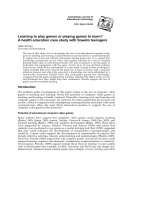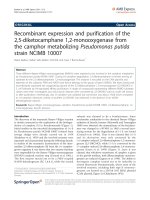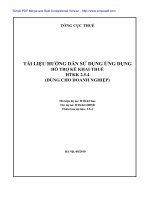5 4 1 learning to play the game TG
Bạn đang xem bản rút gọn của tài liệu. Xem và tải ngay bản đầy đủ của tài liệu tại đây (132.86 KB, 4 trang )
Learning to Play
the Game
The author tells a story about a
brother and sister who have just moved to a
new town. The story focuses on their adjustment to a new group of friends and a school
environment. At first, things seem difficult, but
soon they become more comfortable.
SUMMARY
LESSON VOCABULARY
blunders
complex
fleeing
rustling
civilization
envy
inspired
strategy
INTRODUCE THE BOOK
Discuss with
students the title and the author of Learning
to Play the Game. Ask students to think about
the title and what the book will be about.
Discuss how the phrase “play the game” can
be used to mean a real game or (metaphorically) to mean the “game” of life. Ask: What
do you think the children in this story might
need to learn?
INTRODUCE THE TITLE AND AUTHOR
BUILD BACKGROUND Discuss with students
what they know about moving from one place
to another. Ask: Have you moved to a new
town? What were some of the differences
between your new town and your old community? Discuss how it is sometimes difficult at
first to make new friends.
Invite students to look at the cover of
the book. Discuss what you can tell about the
book just from looking at this illustration.
Ask: What can you guess about how these
children feel? Where are they? Discuss what
students might already be able to predict
about the story they are about to read. Invite
students to examine pages 10-11. Discuss
what the illustrations show. Ask: What is the
bigger girl doing with the younger girl? What
do the labels mean?
PREVIEW
72
5.4.1
DRAW CONCLUSIONS
ANSWER QUESTIONS
READ THE BOOK
Have students set a purpose for
their reading that includes looking at how different characters behave in similar situations.
Suggest that they watch for, and compare,
how Pete and Ella react to their new situation.
SET PURPOSE
STRATEGY SUPPORT: ANSWER QUESTIONS Invite
students to find illustrations in the book that
would help them answer questions the teacher might ask. Discuss why some illustrations
provide better clues than others about what is
going on in the story.
COMPREHENSION QUESTIONS
Look at the illustrations. What are
some of the things Ella and Pete will see in
their new neighborhood? (They will see unfinished houses and a park.)
PAGES 4–5
Based on the illustration, what conclusions can you draw about what is happening
to Pete and Ella? (They are waiting to be chosen for teams to play a game.)
PAGE 8
Look at the final paragraph on the
page. What does this paragraph suggest
about the theme of the book? (The theme is
about adjusting to new situations.)
PAGE 23
Why do you think the author may have
included a page explaining what goes on at
festivals in different towns? (The author is trying to suggest a way to become more comfortable in a new place.)
PAGE 24
Learning to Play the Game
16911_LRD_TG_072-073 72
10/20/05 10:21:46 AM
REVISIT THE BOOK
READER RESPONSE
1. Possible response: They have a new attitude
about their move because they are making
friends.
2. Questions will vary. Possible response for
answers: ask Mom, read books, talk to
friends.
3. Possible response: simple, easy, basic.
4. Possible response: assembly and lunch
routines, location of important places in
school.
Invite students to
examine the photograph on page 24. Discuss
what is going on in the photograph. Ask: What
kind of festival is this? Why would people have
this kind of festival?
EXTEND UNDERSTANDING
RESPONSE OPTIONS
Invite students to write a paragraph
about the first thing they would do to get
comfortable in a new place. Ask: What skill or
talent do you have that could help you make
friends? What kind of club or activity could you
join to get to know new people?
WRITING
Show students a picture of someone
from another culture or country that they are
not familiar with. Discuss how it might feel
for that person to move to the United States.
Ask: What do you think would be some of
the challenges this person might face if he
or she were to come to the United States?
What information could he or she share that
Americans would not know about?
Show students a picture of Americans who
have moved to another country. Discuss the
differences Americans might find. Ask: What
should an American learn about before his or
her move that would make it easier?
Skill Work
TEACH/REVIEW VOCABULARY
Use one of the vocabulary words in a sentence that shows its meaning in context,
such as “I felt envy when my best friend
got new sneakers before I did.” Then invite
students to give another sentence that uses
the vocabulary word. Repeat this process
with each vocabulary word.
TARGET SKILL AND STRATEGY
Remind students
that when we draw conclusions, we read
with the idea that we will make a decision
based on our reading. Suggest that as they
go through this book, they try to draw conclusions about how Ella and Pete are going
to adjust to their new home.
DRAW CONCLUSIONS
ANSWER QUESTIONS Remind students that
answering questions about their reading
helps them to remember important information. Suggest that as they read, they think
about questions the teacher may ask about
their reading and try to take notes about
what their answers will be. Ask: How does
answering your teacher’s questions about a
book help you to draw your own conclusions
about what is happening in the story?
ADDITIONAL SKILL INSTRUCTION
THEME Remind students that when we read
to find the theme, we are looking for the
“big idea” of a story. Discuss how some
books are about the challenges that people
face. Other books are about getting older or
learning to get along with others. Suggest
that as they read, students watch for clues
that will help them determine the theme of
the book.
SOCIAL STUDIES
CONNECTION
Suggest that students
go to the library to look
for books about friendship. Have
them choose sections of the books
that are meaningful to them to share with
their classmates.
Learning to Play the Game
16911_LRD_TG_072-073 73
73
10/20/05 10:21:47 AM
Name
Learning to Play
Draw Conclusions
• When we draw conclusions, we make a decision based on what we have read. We use details
and facts to help us.
Directions Reread the following excerpt from Learning to Play the Game and answer the following
questions.
“Hi,” said Ella. The sudden silence made her nervous. “Ummm . . . we just moved in. I’m
Ella, and this is my brother Pete. Pete, say hello to everyone.”
“Ummm, hello?” was all Pete could say. Ella could tell that her brother was as nervous as
she was!
A tall girl with blond hair nodded. “OK, Ella and Pete,” she said. “I’m Tiffany. We’re going
to play Two Bases. Want to play?”
“Sure,” Ella nodded. “Is it like baseball?”
1. What conclusion can you draw about how well Pete and Ella know the other children?
2. Which detail helped you reach the conclusion for question #1?
3. What conclusion can you draw about who the leader is among the group of children?
4. Which detail helped you reach the conclusion for question #3?
© Pearson Education 5
5. What conclusion can you draw about Ella’s knowledge of the game Two Bases?
74
16911_LRD_TG_074-075 1
10/20/05 10:23:36 AM
Learning to Play
Name
Vocabulary
Directions Review the meanings of these words.
blunders
mistakes
civilization
society; a group of people who follow rules
complex
complicated; not simple
envy
jealousy
fleeing
running away
inspired
hopeful; interested
rustling
shuffling; moving in a noisy way
strategy
approach
Check the Words
You Know
blunders
civilization
complex
envy
fleeing
inspired
rustling
strategy
Directions Read the sentence. Then write your own sentence using each vocabulary word.
1. I hope I didn’t make too many blunders on my spelling test.
2. Our civilization may end if we keep polluting.
3. Understanding how budgets work is a complex idea.
4. I felt envy when I saw their new car.
© Pearson Education 5
5. The mouse was fleeing as the cat chased it.
6. Hearing your new song, I became inspired to write my own song.
7. There was a rustling in the leaves as my cat came near.
8. Our team needed a new strategy if we were going to win the game.
75
16911_LRD_TG_074-075 2
2/3/06 10:27:29 AM









